FDA: Regulations must respond to technological developments
Government regulation can’t keep up with innovation in healthcare technology, especially when dealing with mobile medical applications—and those in charge of developing regulatory framework know it, according to top officials at the FDA in a July 2 viewpoint in JAMA.
The piece—penned by FDA Director Scott Gottlieb, MD; Jeffrey Shuren, MD, JD, director of the Center for Devices and Radiological Health at the FDA; and Bakul Patel, MS, MBA, associate director of digital health at the FDA—argued that efficiency in regulation can encourage development and utilization of mobile medical apps.
“[T]he regulatory framework enacted by Congress in 1976, and incrementally improved since then, is not well suited for software-based technologies, including mobile apps, what FDA and other regulators call ‘software as a medical device’ (SaMD),” they wrote. “Congress’ regulatory framework was designed for hardware-based technologies. For these devices, developers may only modify products every few months to years, and much can be learned about the technology from its design, composition, and bench testing. The effects of these products on patients tend to be readily observable, and knowledge generated about one product often can be applied to others in the same category to expedite regulatory decision-making.”
Gottlieb and his colleagues argue a risk-based approach would protect patient safety while streamlining regulatory approval. SaMD allow for developers to address malfunctions quickly, because software updates can be tailored to address specific concerns.
“[D]evelopers of SaMD, such as clinical decision support software designed to analyze computed tomography results that notifies clinicians of a potential stroke in their patients, can modify their products in response to performance in clinical settings and user feedback every few weeks to months, and little to nothing can be learned about the technology by just reviewing the software code,” they wrote. “The influence of apps on patients may be indirect, and knowledge about one software program generally cannot be applied to other programs with the same intended use.”
Gottlieb et al. then discussed steps the FDA has taken to improve its ability to respond to technological developments in mobile health. Notably, the agency announced a pilot program to certify developers for quality in design and testing procedures. The pre-market approval for an approved developer, the FDA leadership argues, would allow apps to reach patients more quickly.

